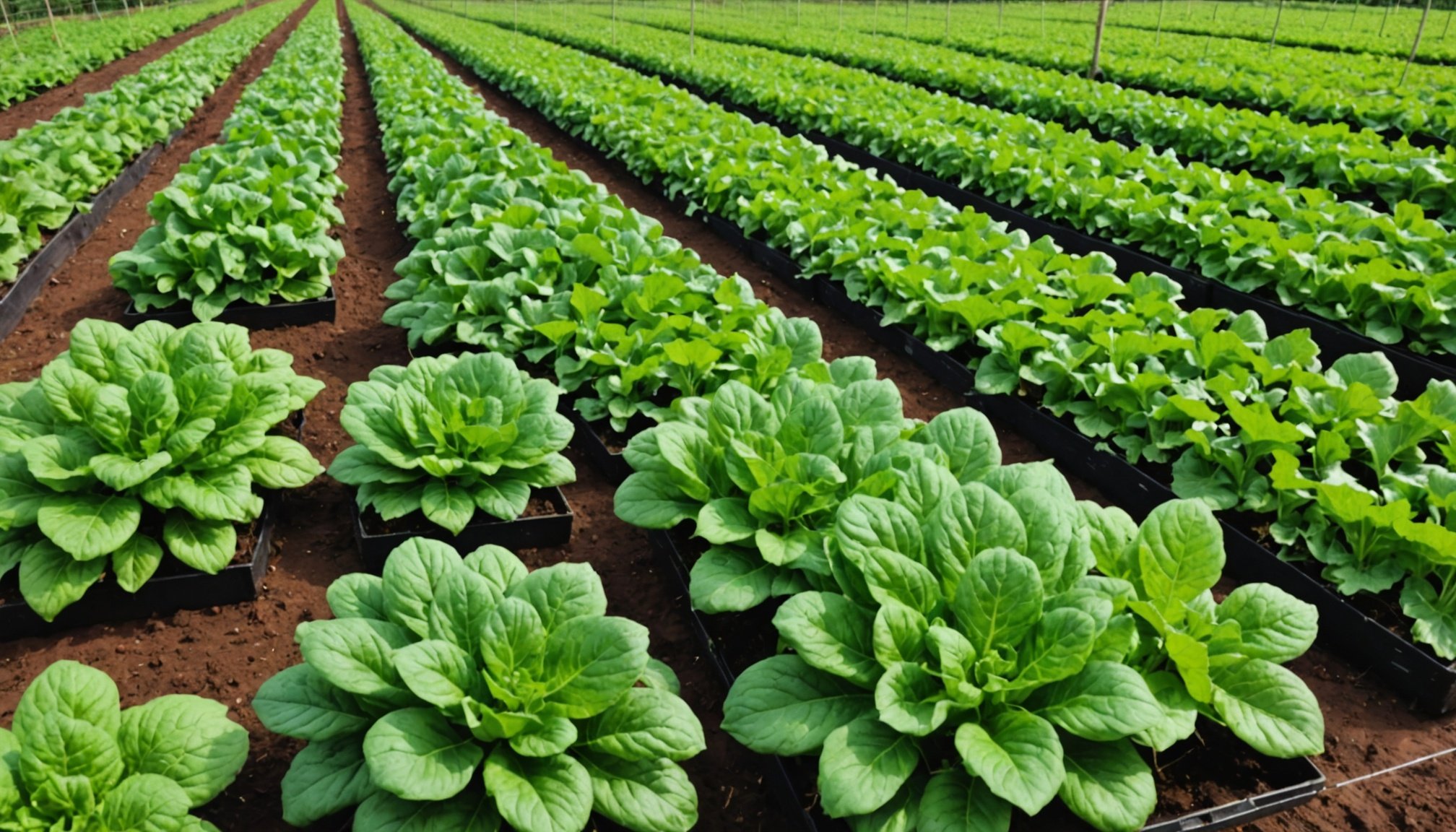Understanding Organic Farming
Organic farming embraces a holistic approach, integrating natural ecosystems to sustain soil fertility and biodiversity. Central to organic farming principles is the prohibition of synthetic fertilizers and pesticides. Instead, it relies on natural processes, crop rotations, compost, and green manure to nurture the land. Sustainably managing natural resources forms the backbone of organic practices, which also emphasise animal welfare and biodiversity.
In the UK, achieving organic certification is essential for farms to be recognized as meeting national standards. This process involves adherence to regulations governed by bodies like the Soil Association. Certified farms must undergo regular inspections to ensure compliance with organic farming principles. The certification assures consumers that products are genuinely organic and produced sustainably.
Have you seen this : Kickstart Your Eco-Friendly Subscription Box in the UK: The Complete Guide to Sustainable Packaging Compliance
Sustainable agriculture is integral to organic farming practices. By maintaining healthy soil ecosystems and promoting biodiversity, organic farming not only improves the quality of produce but also supports ecosystems. This sustainable approach contrasts sharply with conventional farming methods, known for depleting soils and harming biodiversity.
Ultimately, organic certifications ensure that farms implement these transformative and foundational principles, thereby establishing trust and transparency in the market. For farmers, understanding these frameworks is vital to align practices with both ethical and market expectations.
Have you seen this : Your ultimate roadmap to starting a successful uk virtual bookkeeping business
Planning Your Organic Vegetable Farm
Embarking on an organic farm venture begins with meticulous farm planning. A key aspect is site selection. Ideal locations offer ample sunlight, good drainage, and access to water. Soil type is critical; loamy soil, rich in nutrients, promotes healthy crop growth.
Once the perfect site is chosen, crop rotation becomes vital. This strategy not only optimises land use but also bolsters soil health. Different crops have varied nutrient needs and pest issues, so rotating crops helps prevent soil depletion and disrupts pest cycles, ultimately leading to a thriving ecosystem.
Beyond environmental strategies, a robust business plan is indispensable. It serves as a roadmap, outlining objectives, potential markets, expenses, and revenue streams. A well-structured plan helps you make informed decisions and manage risks effectively.
Consider maintenance of soil health as an ongoing process. Incorporating cover crops, organic compost, and green manure enriches soil nutrients, fostering sustainable growth. Active planning and conscientious management set the foundation for successful organic farming.
The thoughtful integration of location, rotational planting, and comprehensive financial blueprints are central to farming success and enduring ecological impact. The continuity of these practices lies at the heart of efficient organic farm management.
Legal Requirements for Organic Farming in the UK
Navigating the legal requirements for organic farming is essential for compliance and success. To meet these standards, aspiring farmers must understand the certification process and adhere strictly to regulations. Organic certification in the UK is overseen by organizations such as the Soil Association. This process involves ensuring that farms uphold the principles of sustainable agriculture and extensive compliance checks.
To obtain certification, the initial step is to submit an application detailing your farm practices. Following this, an inspector visits the farm to verify adherence to organic farming principles, including the exclusion of synthetic chemicals and incorporation of natural inputs. Once certified, farms are subject to annual re-inspections to maintain compliance. Understanding this rigorous process is crucial for ensuring the integrity and credibility of organic produce.
Keeping abreast of evolving regulations is vital. Amendments may affect certifications, and farms must adapt accordingly. Regular updates and guidance from certifying bodies help farmers remain compliant. Access to workshops and training can further improve farmers’ understanding of the certification criteria and evolving standards. Being proactive about these requirements not only fortifies market trust but also supports the broader goals of sustainable and responsible farming.
Best Practices for Organic Crop Management
Effective crop management techniques are essential for maintaining soil fertility and sustaining productive organic farming. Central to this is the use of organic fertilizers and amendments, which enhance soil health without synthetic chemicals. Compost, green manure, and cover crops enrich the soil, promoting robust plant growth.
To further optimise soil fertility, integrate methods such as crop rotation. This practice helps manage soil nutrients and curtail pest cycles. It maximises productivity by alternating crops with different nutritional needs and resistance traits.
Successfully managing pests and weeds requires a strategy that aligns with organic principles. Embracing organic inputs for pest control ensures crop health without environmental damage. Solutions like neem oil, diatomaceous earth, and organic mulches effectively suppress pests while maintaining ecosystem balance.
Additionally, fostering biodiversity by cultivating a range of crop types and incorporating companion planting can naturally deter pests. Beneficial insects like ladybugs and predatory mites provide organic pest control.
These comprehensive techniques not only bolster soil vitality but also lead to healthier, more resilient crops, thereby securing the sustainability and profitability of organic farming practices. Through careful management and adherence to organic methodologies, farmers can ensure their crops thrive while supporting the broader agricultural ecosystem.
Selecting the Right Crops for Your Farm
Choosing the appropriate crops for your organic farm is a critical decision that hinges on several factors. Crop selection is pivotal, given its impact on farm productivity and sustainability. To make informed choices, consider your site’s unique characteristics, such as soil type and climate, while also weighing broader considerations like market trends and seasonal demand.
Seasonal planting is particularly significant in the UK, known for its distinct climate variations. UK farmers should tailor their planting schedules to the four seasons, optimising crop yield throughout the year. For example, root vegetables thrive well in cooler months, whereas crops like tomatoes flourish in summer. Aligning planting decisions with season-specific advantages ensures a steady supply of produce.
Acknowledging market demand is essential. Identify crops with high consumer interest by analysing trends and preferences in your targeted sales regions. This understanding not only aids in crop selection but also guides potential market opportunities. Besides traditional markets, consider niche demands for exotic or less-common varieties. Focusing on consumer-driven production strengthens profitability and aligns with sustainable organic farming principles.
Pest Management in Organic Farming
Pest management is crucial in maintaining the health and productivity of an organic farm. At its core, integrated pest management (IPM) strategies offer an ecological approach by combining diverse tactics. These include cultural, biological, and mechanical methods to control pests, thereby reducing reliance on synthetic chemicals.
Natural predators play a pivotal role in organic pest control. Introducing beneficial insects, such as ladybirds, lacewings, and parasitic wasps, can naturally suppress pest populations. Encouraging their presence requires planting flowers that provide nectar and pollen, thus creating a balanced ecosystem where these predators thrive.
In addition to predators, organic repellents offer an effective barrier against pests. Neem oil, garlic sprays, and chili pepper solutions can deter a wide array of insects while being safe for crops and the environment. Properly applying these repellents involves understanding the specific pests affecting your farm and tailoring solutions to address them effectively.
Creating a pest management plan is essential, especially in the UK where climate and regional variations influence pest dynamics. Developing site-specific strategies ensures that interventions are effective and sustainable. In this way, farmers can protect their harvests while adhering to the environmental principles of organic farming.
Marketing Your Organic Produce
Effective marketing strategies are crucial for the success of an organic farm. Embrace diverse channels to connect with consumers and emphasise the unique benefits of your produce. Establish a strong presence in farmers’ markets, which are popular platforms for selling organic products. These markets offer direct sales opportunities and allow for personal interaction with customers, fostering trust and transparency.
Explore online platforms to broaden your reach beyond local markets. Utilising social media and e-commerce sites facilitates a wider audience, allowing you to showcase the quality and sustainability of your organic produce. Online marketing also provides tools for engaging storytelling, which can highlight your farm’s journey and commitment to organic practices.
Building and maintaining customer relationships is essential. Develop loyalty programs or offer subscription boxes to encourage repeat business. Consider collaborating with local chefs or restaurants to create partnerships that showcase your produce. Engaging with your community through farm tours or workshops can deepen customer connections and promote your brand as trustworthy and ethically driven.
Incorporating a mix of direct and digital sales strategies helps in reaching various demographics, ensuring consistent demand and a strong consumer base for your organic products. Always emphasise the health benefits, environmental impact, and quality to captivate your audience.
Resources and Support for Organic Farmers
Embarking on organic farming requires a foundation of reliable farming resources and strong community support. Many new farmers might feel overwhelmed, yet numerous resources exist to assist. Consider becoming acquainted with local agricultural extension services, which offer technical guidance and essential resources. These services play a crucial role, providing information that aids in overcoming farming challenges.
Community organisations and farming networks are invaluable in offering community support. Engaging with such groups provides opportunities for knowledge exchange, mentorship, and joint problem-solving. This camaraderie can be vital, especially when dealing with the unique challenges of starting and maintaining an organic farm.
Furthermore, explore how agricultural extension services can boost your efforts. These services include workshops, training sessions, and access to research and innovation. They empower farmers to implement effective practices and stay abreast of developments in organic farming.
Local organisations often provide workshops, networking opportunities, and agricultural extension services, equipping farmers with necessary knowledge and connections. Being part of these circles not only enhances practical skills but can significantly impact the farm’s success by creating a resilient and supportive network, ensuring that as challenges arise, solutions and support are within reach.
Costs and Financial Considerations
Starting an organic farm involves financial investments requiring thoughtful planning. Understanding the farming costs is crucial, as these include both initial and ongoing expenses. Initial costs cover land acquisition, infrastructure development, and equipment purchases. Ongoing costs involve seeds, organic inputs, labour, and maintenance.
Effective financial planning is essential. A well-crafted budget helps track expenses and ensures efficient resource allocation. Begin by estimating startup costs, such as soil amendments, organic fertilizer, and irrigation systems. Factor in labour expenses, as skilled workers are vital for implementing organic practices. Include contingency funds for unexpected costs, ensuring financial resilience.
Amongst the various strategies, creating a financial roadmap enhances decision-making. Set realistic revenue projections based on market research and crop yield estimates. Regularly review and adjust your budget to reflect changes in costs or market dynamics.
Access to funding opportunities is pivotal. Numerous government and private grants exist for sustainable agriculture initiatives. Explore agricultural loans and subsidies to support financial commitments. Additionally, crowdfunding platforms can be leveraged to raise funds and engage community support for your farm’s mission.
By meticulously managing costs and financial resources, organic farmers can establish a sustainable and economically viable operation, ensuring long-term success and growth.











